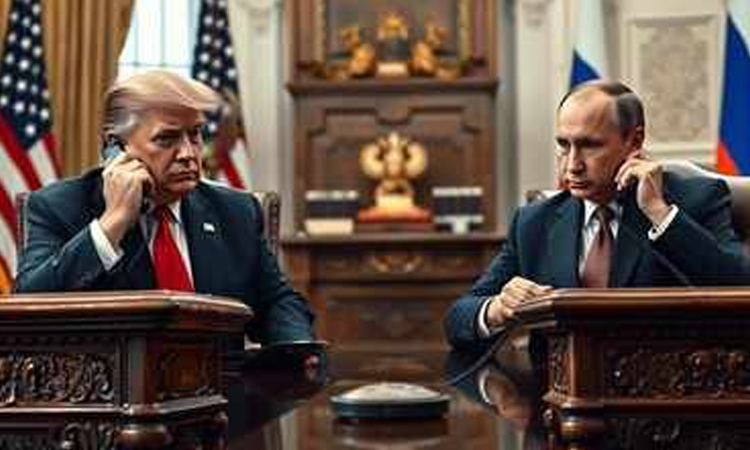News Flash

WASHINGTON, May 19, 2025 (BSS/AFP) - Donald Trump will speak by phone Monday
with Russia's Vladimir Putin as part of the US leader's effort to end the
grinding war set off by Moscow's 2022 invasion of Ukraine.
Trump had vowed during his US election campaign to halt the conflict within a
day of taking office, but his diplomatic efforts have so far yielded little
progress.
Russia, which launched what Kyiv called a "record" drone attack on Ukraine at
the weekend, said Monday it would prefer to end the conflict through
diplomacy and described the upcoming call as "important".
"It is preferable to achieve our goals through political and diplomatic
means, of course," Kremlin spokesman Dmitry Peskov told state media, adding
that Russia "highly valued" Washington's attempts to end the fighting.
Delegations from Russia and Ukraine held direct negotiations in Istanbul last
week for the first time about three years, but the talks ended without a
commitment to a ceasefire.
Both sides traded insults, with Ukraine accusing Moscow of sending a "dummy"
delegation of low-ranking officials.
After the negotiations, Trump announced that he would speak by phone with the
Russian president in a bid to end the "BLOODBATH" in Ukraine, which has
destroyed large swathes of the country and displaced millions of people.
Trump also said he would speak to Ukrainian President Volodymyr Zelensky and
NATO officials, expressing hope that a "ceasefire will take place, and this
very violent war... will end".
Trump has directed much of his frustration towards Ukraine while abstaining
from extensively criticising Putin.
The US president has also argued that "nothing's going to happen" on the
conflict until he meets Putin face-to-face.
- Push for sanctions -
At the talks in Istanbul, which were also attended by US officials, Russia
and Ukraine agreed to exchange 1,000 prisoners each and trade ideas on a
possible truce, but with no concrete commitment.
Ukraine's Western allies have since accused Putin of deliberately ignoring
calls for a ceasefire and pushed for fresh sanctions against Russia.
The leaders of Britain, France, Germany and Italy held a phone call with
Trump on Sunday.
"The leaders discussed the need for an unconditional ceasefire and for
President Putin to take peace talks seriously," said a spokesman for British
Prime Minister Keir Starmer.
"They also discussed the use of sanctions if Russia failed to engage
seriously in a ceasefire and peace talks," the spokesman said.
"Putin must agree to a ceasefire and peace talks," German Chancellor
Friedrich Merz, who also took part in the call, wrote on X, adding that the
European leaders aimed to talk to the US president once again on Monday.
Zelensky also discussed possible sanctions with US Vice President JD Vance
when they met after Pope Leo's inaugural mass at the Vatican on Sunday.
A senior Ukrainian official from the president's office, who spoke on
condition of anonymity, told AFP that they had also discussed preparations
for Monday's telephone conversation between Trump and Putin.
- 'Root causes' -
It was the first meeting between Zelensky and Vance since their heated White
House exchange in February.
In the Oval Office, Vance publicly accused Zelensky of being "disrespectful"
towards Trump, who told the Ukrainian leader he should be more grateful and
that he had no "cards" to play in negotiations with Russia.
On the ground, the Russian army claimed to capture two villages in Ukraine's
eastern Sumy and Donetsk regions.
Russia also fired 112 drones on Ukraine overnight, 76 of which were repelled,
the Ukrainian air force said.
In an interview with Russian state TV broadcast on Sunday, Putin said that
Moscow's aim was to "eliminate the causes that triggered this crisis, create
the conditions for a lasting peace and guarantee Russia's security", without
elaborating further.
Russia's references to the "root causes" of the conflict typically refer to
grievances with Kyiv and the West that Moscow has put forward as
justification for launching the invasion in February 2022.
They include pledges to "de-Nazify" and demilitarise Ukraine, protect Russian
speakers in the country's east, push back against NATO expansion and stop
Ukraine's westward geopolitical drift.
Kyiv and the West deny Moscow's claims and say that Russia's invasion is an
imperial-style land grab.